#kazan governorate
Text

Zoe Kazan @ Governors Awards
0 notes
Text
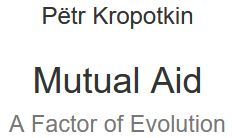
Footnotes, 101-150
[101] Gill, quoted in Gerland and Waitz’s Anthropologie, v. 641. See also pp. 636–640, where many facts of parental and filial love are quoted.
[102] Primitive Folk, London, 1891.
[103] Gerland, loc. cit. v. 636.
[104] Erskine, quoted in Gerland and Waitz’s Anthropologie, v. 640.
[105] W.T. Pritchard, Polynesian Reminiscences, London, 1866, p. 363.
[106] It is remarkable, however, that in case of a sentence of death, nobody will take upon himself to be the executioner. Every one throws his stone, or gives his blow with the hatchet, carefully avoiding to give a mortal blow. At a later epoch, the priest will stab the victim with a sacred knife. Still later, it will be the king, until civilization invents the hired hangman. See Bastian’s deep remarks upon this subject in Der Mensch in der Geschichte, iii. Die Blutrache, pp. 1–36. A remainder of this tribal habit, I am told by Professor E. Nys, has survived in military executions till our own times. In the middle portion of the nineteenth century it was the habit to load the rifles of the twelve soldiers called out for shooting the condemned victim, with eleven ball-cartridges and one blank cartridge. As the soldiers never knew who of them had the latter, each one could console his disturbed conscience by thinking that he was not one of the murderers.
[107] In Africa, and elsewhere too, it is a widely-spread habit, that if a theft has been committed, the next clan has to restore the equivalent of the stolen thing, and then look itself for the thief. A. H. Post, Afrikanische Jurisprudenz, Leipzig, 1887, vol. i. p. 77.
[108] See Prof. M. Kovalevsky’s Modern Customs and Ancient Law (Russian), Moscow, 1886, vol. ii., which contains many important considerations upon this subject.
[109] See Carl Bock, The Head Hunters of Borneo, London, 1881. I am told, however, by Sir Hugh Law, who was for a long time Governor of Borneo, that the “head-hunting” described in this book is grossly exaggerated. Altogether, my informant speaks of the Dayaks in exactly the same sympathetic terms as Ida Pfeiffer. Let me add that Mary Kingsley speaks in her book on West Africa in the same sympathetic terms of the Fans, who had been represented formerly as the most “terrible cannibals.”
[110] Ida Pfeiffer, Meine zweite Weltrieze, Wien, 1856, vol. i. pp. 116 seq. See also Müller and Temminch’s Dutch Possessions in Archipelagic India, quoted by Elisée Reclus, in Géographie Universelle, xiii.
[111] Descent of Man, second ed., pp. 63, 64.
[112] See Bastian’s Mensch in der Geschichte, iii. p. 7. Also Gray, loc. cit. ii. p. 238.
[113] Miklukho-Maclay, loc. cit. Same habit with the Hottentots.
[114] Numberless traces of post-pliocene lakes, now disappeared, are found over Central, West, and North Asia. Shells of the same species as those now found in the Caspian Sea are scattered over the surface of the soil as far East as half-way to Lake Aral, and are found in recent deposits as far north as Kazan. Traces of Caspian Gulfs, formerly taken for old beds of the Amu, intersect the Turcoman territory. Deduction must surely be made for temporary, periodical oscillations. But with all that, desiccation is evident, and it progresses at a formerly unexpected speed. Even in the relatively wet parts of South-West Siberia, the succession of reliable surveys, recently published by Yadrintseff, shows that villages have grown up on what was, eighty years ago, the bottom of one of the lakes of the Tchany group; while the other lakes of the same group, which covered hundreds of square miles some fifty years ago, are now mere ponds. In short, the desiccation of North-West Asia goes on at a rate which must be measured by centuries, instead of by the geological units of time of which we formerly used to speak.
[115] Whole civilizations had thus disappeared, as is proved now by the remarkable discoveries in Mongolia on the Orkhon and in the Lukchun depression (by Dmitri Clements).
[116] If I follow the opinions of (to name modern specialists only) Nasse, Kovalevsky, and Vinogradov, and not those of Mr. Seebohm (Mr. Denman Ross can only be named for the sake of completeness), it is not only because of the deep knowledge and concordance of views of these three writers, but also on account of their perfect knowledge of the village community altogether — a knowledge the want of which is much felt in the otherwise remarkable work of Mr. Seebohm. The same remark applies, in a still higher degree, to the most elegant writings of Fustel de Coulanges, whose opinions and passionate interpretations of old texts are confined to himself.
[117] The literature of the village community is so vast that but a few works can be named. Those of Sir Henry Maine, Mr. Seebohm, and Walter’s Das alte Wallis (Bonn, 1859), are well-known popular sources of information about Scotland, Ireland, and Wales. For France, P. Viollet, Précis de l’histoire du droit français. Droit privé, 1886, and several of his monographs in Bibl. de l’Ecole des Chartes; Babeau, Le Village sous l’ancien régime (the mir in the eighteenth century), third edition, 1887; Bonnemère, Doniol, etc. For Italy and Scandinavia, the chief works are named in Laveleye’s Primitive Property, German version by K. Bücher. For the Finns, Rein’s Föreläsningar, i. 16; Koskinen, Finnische Geschichte, 1874, and various monographs. For the Lives and Coures, Prof. Lutchitzky in Severnyi Vestnil, 1891. For the Teutons, besides the well-known works of Maurer, Sohm (Altdeutsche Reichs- und Gerichts- Verfassung), also Dahn (Urzeit, Völkerwanderung, Langobardische Studien), Janssen, Wilh. Arnold, etc. For India, besides H. Maine and the works he names, Sir John Phear’s Aryan Village. For Russia and South Slavonians, see Kavelin, Posnikoff, Sokolovsky, Kovalevsky, Efimenko, Ivanisheff, Klaus, etc. (copious bibliographical index up to 1880 in the Sbornik svedeniy ob obschinye of the Russ. Geog. Soc.). For general conclusions, besides Laveleye’s Propriété, Morgan’s Ancient Society, Lippert’s Kulturgeschichte, Post, Dargun, etc., also the lectures of M. Kovalevsky (Tableau des origines et de l’évolution de la famille et de la propriété, Stockholm, 1890). Many special monographs ought to be mentioned; their titles may be found in the excellent lists given by P. Viollet in Droit privé and Droit public. For other races, see subsequent notes.
[118] Several authorities are inclined to consider the joint household as an intermediate stage between the clan and the village community; and there is no doubt that in very many cases village communities have grown up out of undivided families. Nevertheless, I consider the joint household as a fact of a different order. We find it within the gentes; on the other hand, we cannot affirm that joint families have existed at any period without belonging either to a gens or to a village community, or to a Gau. I conceive the early village communities as slowly originating directly from the gentes, and consisting, according to racial and local circumstances, either of several joint families, or of both joint and simple families, or (especially in the case of new settlements) of simple families only. If this view be correct, we should not have the right of establishing the series: gens, compound family, village community — the second member of the series having not the same ethnological value as the two others. See Appendix IX.
[119] Stobbe, Beiträg zur Geschichte des deutschen Rechtes, p. 62.
[120] The few traces of private property in land which are met with in the early barbarian period are found with such stems (the Batavians, the Franks in Gaul) as have been for a time under the influence of Imperial Rome. See Inama-Sternegg’s Die Ausbildung der grossen Grundherrschaften in Deutschland, Bd. i. 1878. Also, Besseler, Neubruch nach dem älteren deutschen Recht, pp. 11–12, quoted by Kovalevsky, Modern Custom and Ancient Law, Moscow, 1886, i. 134.
[121] Maurer’s Markgenossenschaft; Lamprecht’s “Wirthschaft und Recht der Franken zur Zeit der Volksrechte,” in Histor. Taschenbuch, 1883; Seebohm’s The English Village Community, ch. vi, vii, and ix.
[122] Letourneau, in Bulletin de la Soc. d’Anthropologie, 1888, vol. xi. p. 476.
[123] Walter, Das alte Wallis, p. 323; Dm. Bakradze and N. Khoudadoff in Russian Zapiski of the Caucasian Geogr. Society, xiv. Part I.
[124] Bancroft’s Native Races; Waitz, Anthropologie, iii. 423; Montrozier, in Bull. Soc. d’Anthropologie, 1870; Post’s Studien, etc.
[125] A number of works, by Ory, Luro, Laudes, and Sylvestre, on the village community in Annam, proving that it has had there the same forms as in Germany or Russia, is mentioned in a review of these works by Jobbé-Duval, in Nouvelle Revue historique de droit français et étranger, October and December, 1896. A good study of the village community of Peru, before the establishment of the power of the Incas, has been brought out by Heinrich Cunow (Die Soziale Verfassung des Inka-Reichs, Stuttgart, 1896. The communal possession of land and communal culture are described in that work.
[126] Kovalevsky, Modern Custom and Ancient Law, i. 115.
[127] Palfrey, History of New England, ii. 13; quoted in Maine’s Village Communities, New York, 1876, p. 201.
[128] Königswarter, Études sur le développement des sociétés humaines, Paris, 1850.
[129] This is, at least, the law of the Kalmucks, whose customary law bears the closest resemblance to the laws of the Teutons, the old Slavonians, etc.
[130] The habit is in force still with many African and other tribes.
[131] Village Communities, pp. 65–68 and 199.
[132] Maurer (Gesch. der Markverfassung, sections 29, 97) is quite decisive upon this subject. He maintains that “All members of the community... the laic and clerical lords as well, often also the partial co-possessors (Markberechtigte), and even strangers to the Mark, were submitted to its jurisdiction” (p. 312). This conception remained locally in force up to the fifteenth century.
[133] Königswarter, loc. cit. p. 50; J. Thrupp, Historical Law Tracts, London, 1843, p. 106.
[134] Königswarter has shown that the ferd originated from an offering which had to be made to appease the ancestors. Later on, it was paid to the community, for the breach of peace; and still later to the judge, or king, or lord, when they had appropriated to themselves the rights of the community.
[135] Post’s Bausteine and Afrikanische Jurisprudenz, Oldenburg, 1887, vol. i. pp. 64 seq.; Kovalevsky, loc. cit. ii. 164–189.
[136] O. Miller and M. Kovalevsky, “In the Mountaineer Communities of Kabardia,” in Vestnik Evropy, April, 1884. With the Shakhsevens of the Mugan Steppe, blood feuds always end by marriage between the two hostile sides (Markoff, in appendix to the Zapiski of the Caucasian Geogr. Soc. xiv. 1, 21).
[137] Post, in Afrik. Jurisprudenz, gives a series of facts illustrating the conceptions of equity inrooted among the African barbarians. The same may be said of all serious examinations into barbarian common law.
[138] See the excellent chapter, “Le droit de La Vieille Irlande,” (also “Le Haut Nord”) in Études de droit international et de droit politique, by Prof. E. Nys, Bruxelles, 1896.
[139] Introduction, p. xxxv.
[140] Das alte Wallis, pp. 343–350.
[141] Maynoff, “Sketches of the Judicial Practices of the Mordovians,” in the ethnographical Zapiski of the Russian Geographical Society, 1885, pp. 236, 257.
[142] Henry Maine, International Law, London, 1888, pp. 11–13. E. Nys, Les origines du droit international, Bruxelles, 1894.
[143] A Russian historian, the Kazan Professor Schapoff, who was exiled in 1862 to Siberia, has given a good description of their institutions in the Izvestia of the East-Siberian Geographical Society, vol. v. 1874.
[144] Sir Henry Maine’s Village Communities, New York, 1876, pp. 193–196.
[145] Nazaroff, The North Usuri Territory (Russian), St. Petersburg, 1887, p. 65.
[146] Hanoteau et Letourneux, La Kabylie, 3 vols. Paris, 1883.
[147] To convoke an “aid” or “bee,” some kind of meal must be offered to the community. I am told by a Caucasian friend that in Georgia, when the poor man wants an “aid,” he borrows from the rich man a sheep or two to prepare the meal, and the community bring, in addition to their work, so many provisions that he may repay tHe debt. A similar habit exists with the Mordovians.
[148] Hanoteau et Letourneux, La kabylie, ii. 58. The same respect to strangers is the rule with the Mongols. The Mongol who has refused his roof to a stranger pays the full blood-compensation if the stranger has suffered therefrom (Bastian, Der Mensch in der Geschichte, iii. 231).
[149] N. Khoudadoff, “Notes on the Khevsoures,” in Zapiski of the Caucasian Geogr. Society, xiv. 1, Tiflis, 1890, p. 68. They also took the oath of not marrying girls from their own union, thus displaying a remarkable return to the old gentile rules.
[150] Dm. Bakradze, “Notes on the Zakataly District,” in same Zapiski, xiv. 1, p. 264. The “joint team” is as common among the Lezghines as it is among the Ossetes.
#organization#revolution#mutual aid#anarchism#daily posts#communism#anti capitalist#anti capitalism#late stage capitalism#anarchy#anarchists#libraries#leftism#social issues#economy#economics#climate change#anarchy works#environmentalism#environment#solarpunk#anti colonialism#a factor of evolution#petr kropotkin
12 notes
·
View notes
Text

Hill Mari cross, early 20th century.
"The decoration was made by artisans of the village of Chalomkino (mari Салымсола) of Kozmodemyansky Uezd of Kazan Governorate (now in Gornomariysky District of Mari El) in the beginning of 20th century. Since the second half of the 19th century, the Mari village of Chalomkino was a major center for the production of crosses and gaitan chains from low-grade silver. The products of Chalomkino jewelers were widely known in different regions of Russia. The fishery ceased to exist only in the 1920s."
From collection of Tatyana Kryukova.
3 notes
·
View notes
Text
A teenage girl has shot and killed a fellow pupil in a school in western Russia before shooting herself.
The attack happened in the city of Bryansk, close to the Ukrainian and Belarusian borders, on Thursday morning.
Five people were injured in the shooting, one of them seriously, Russian authorities said.
The gun used by the girl was registered in her father's name, a parliamentarian said.
Police were called to Gymnasium No 5 in Bryansk at about 09:15 local time (06:15 GMT) on Thursday.
Alexey Kuznetsov, Russia's deputy health minister, said one victim was undergoing surgery.
Police say they believe the 14-year-old girl may have been involved in a conflict with classmates.
Students, teachers and parents at the school have been offered psychological support, journalists were told by the local authorities.
Alexander Khinshtein, a member of the Russian Duma, said on his Telegram account that the girl's belongings, including a box of bullets, were found during a search of the school.
Mr Khinshtein added that one of the reasons the tragedy occurred was the "neglectful attitude" towards the storage of the gun.
Russia has strict laws on guns, which need to be stored in a special safe, accessible only by the legal gun owner. It has to be regularly inspected by police.
Russian news agency RIA said students barricaded themselves in the classroom when they heard shots being fired.
"The boys barricaded the door with the desks, one girl called the police, the teacher was calling everyone else," RIA quoted one of the school girls.
The governor of the Bryansk region, Alexander Bogomaz, called the shooting a "terrible tragedy".
There have been several school shootings in Russia in recent years, although Thursday's incident is believed to be the first involving a female shooter.
In 2021, a 19-year-old killed seven children and two adults at a Kazan school.
The following year, 18 people were killed at a school in Udmurtia.
6 notes
·
View notes
Text
Events 11.17 (after 1950)
1950 – Lhamo Dondrub is officially named the 14th Dalai Lama.
1950 – United Nations Security Council Resolution 89 relating to the Palestine Question is adopted.
1953 – The remaining human inhabitants of the Blasket Islands, Kerry, Ireland, are evacuated to the mainland.
1957 – Vickers Viscount G-AOHP of British European Airways crashes at Ballerup after the failure of three engines on approach to Copenhagen Airport. The cause is a malfunction of the anti-icing system on the aircraft. There are no fatalities.
1962 – President John F. Kennedy dedicates Washington Dulles International Airport, serving the Washington, D.C., region.
1967 – Vietnam War: Acting on optimistic reports that he had been given on November 13, U.S. President Lyndon B. Johnson tells the nation that, while much remained to be done, "We are inflicting greater losses than we're taking…We are making progress."
1968 – British European Airways introduces the BAC One-Eleven into commercial service.
1968 – Viewers of the Raiders–Jets football game in the eastern United States are denied the opportunity to watch its exciting finish when NBC broadcasts Heidi instead, prompting changes to sports broadcasting in the U.S.
1969 – Cold War: Negotiators from the Soviet Union and the United States meet in Helsinki, Finland to begin SALT I negotiations aimed at limiting the number of strategic weapons on both sides.
1970 – Vietnam War: Lieutenant William Calley goes on trial for the My Lai Massacre.
1970 – Luna programme: The Soviet Union lands Lunokhod 1 on Mare Imbrium (Sea of Rains) on the Moon. This is the first roving remote-controlled robot to land on another world and is released by the orbiting Luna 17 spacecraft.
1973 – Watergate scandal: In Orlando, Florida, U.S. President Richard Nixon tells 400 Associated Press managing editors "I am not a crook."
1973 – The Athens Polytechnic uprising against the military regime ends in a bloodshed in the Greek capital.
1983 – The Zapatista Army of National Liberation is founded in Mexico.
1986 – The flight crew of Japan Airlines Flight 1628 are involved in a UFO sighting incident while flying over Alaska.
1989 – Cold War: Velvet Revolution begins: In Czechoslovakia, a student demonstration in Prague is quelled by riot police. This sparks an uprising aimed at overthrowing the communist government (it succeeds on December 29).
1990 – Fugendake, part of the Mount Unzen volcanic complex, Nagasaki Prefecture, Japan, becomes active again and erupts.
1993 – United States House of Representatives passes a resolution to establish the North American Free Trade Agreement.
1993 – In Nigeria, General Sani Abacha ousts the government of Ernest Shonekan in a military coup.
1997 – In Luxor, Egypt, 62 people are killed by six Islamic militants outside the Temple of Hatshepsut, known as Luxor massacre.
2000 – A catastrophic landslide in Log pod Mangartom, Slovenia, kills seven, and causes millions of SIT of damage. It is one of the worst catastrophes in Slovenia in the past 100 years.
2000 – Alberto Fujimori is removed from office as president of Peru.
2003 – Actor Arnold Schwarzenegger’s tenure as the governor of California began.
2012 – At least 50 schoolchildren are killed in an accident at a railway crossing near Manfalut, Egypt.
2013 – Fifty people are killed when Tatarstan Airlines Flight 363 crashes at Kazan Airport, Russia.
2013 – A rare late-season tornado outbreak strikes the Midwest. Illinois and Indiana are most affected with tornado reports as far north as lower Michigan. In all around six dozen tornadoes touch down in approximately an 11-hour time period, including seven EF3 and two EF4 tornadoes.
2019 – The first known case of COVID-19 is traced to a 55-year-old man who had visited a market in Wuhan, Hubei Province, China.
2 notes
·
View notes
Text

ZOE KAZAN at the 13th Governors Awards on November 19th 2022 wearing CHRISTIAN DIOR COUTURE
Zoe kept her look very crisp and clean, a very mature look that’s giving Wednesday Addams vibes. I really loved how much of the top is white lace, rather than having more of the dark black velvet. Her hair and makeup paired perfectly with the dress. I thought the beauty choices really accentuated her eyes.
#zoe kazan#christian dior couture#christian dior haute couture#dior#dior fashion#actress#love#fashion journalism#dior couture#celebrity fashion#christian dior#beauty#makeup#red carpet#fashion#stunning#gorgeous#celebs#celebrity#celebrities#red carpet fashion#hot celebs#celebrity style#fancyschmancy#red carpet looks#red carpet dress#beautiful#femaledaily#style#fashion inspiration
5 notes
·
View notes
Text
Thursday 20 February 1840
8 ½
very fine morning ordered traineau for 12 – breakfast at 9 50/.. – thought to have time to write to countess A. P. – sat down to write about 10 ½ - had just finished my note 4pp. of one ½ sheet and 1 ½ another (very thin Moscow paper) when Madame Paul femme du Colonel Paul chef de la police called and sat above ½ hour – she was no sooner gone than Madame Terenin came and sat as long or longer till after one so that it is half past two before I have just copied my note to countess A. Panin – out at 3 to Madame de Lapteff – admitted! – dined with her – gave her my letter to “à Madame Madame La Comtesse Alexandrine Panin à Moscou” – Madame de L- very agreeable and civil – home at 4 ½ - put on warm boots etc. and at 4 ¾ out in our traineau that had been in waiting since before noon – drove to the monument and thence to the picturesque monastery on the hill from whence the mine was sprung that made the breach at the taking of Kazan – drove into the enclosure – a churchyard full of tombs – then drove to the Amirauté a large Slobode suburb village belong to Kazan – home by the Kremlin – the archway of the square tower about 18ft. wide and 24ft. to the crown of the arch – 3 square grades then 2 octagon, then 3 grades (round) up to the pinnacle top – this fine tower the most striking thing in Kazan – home at 6 – dressed – Madame Ereméef sent her carriage about 8 ¼ - several gentlemen among the rest the general governor for 10 minutes – the mother of Madame E- there Madame Poltaratzky of Moscow, a nice enough talkative with infiniment de filles, sisters of Madame E- whose curiosity and never ending questions were astounding – supper here too but home at 11 ½ - never so stared at as by Madame Terenin the day we dined chez son père, the general gouverneur and never so questioned as tonight – tremendous!
3 notes
·
View notes
Text
Saints&Reading: Thursday, February 22, 2024
february 9_february 22
THE HOLY MARTYR NICEPHOROS OF ANTIOCH (ca 257)
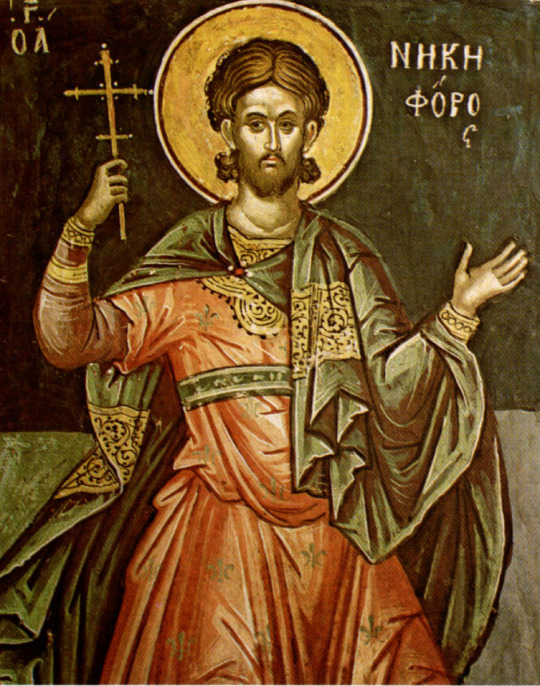
The Holy Martyr Nicephoros (Nikēphóros) lived in the city of Syrian Antioch, as well as presbyter Sapricius, with whom Nikephoros was so close that they were considered brothers. One day they quarreled because of some disagreement, and their former friendship changed into enmity and hate.
After a certain time Nikephoros came to his senses, repented of his sin and more than once asked Sapricius, through mutual friends, to forgive him. Sapricius, however, did not wish to forgive him. Nikephoros then went to his former friend and fervently asked forgiveness, but Sapricius was adamant.
At this time the emperors Valerian (253-259) and Gallius (260-268) began to persecute Christians, and one of the first brought before the court was the priest Sapricius. He firmly confessed himself a Christian, underwent tortures for his faith and was condemned to death by beheading with a sword. As they led Sapricius to execution, Nikephoros tearfully implored his forgiveness saying, “O martyr of Christ, forgive me if I have sinned against you in any way.”
The priest Sapricius remained stubborn, and even as he approached death he refused to forgive his fellow Christian. Seeing the hardness of his heart, the Lord withdrew His blessing from Sapricius, and would not let him receive the crown of martyrdom. At the last moment, he suddenly became afraid of death and agreed to offer sacrifice to idols. In vain did Saint Nikephoros urge Sapricius not to lose his reward through apostasy, since he already stood on the threshold of the heavenly Kingdom.
Saint Nikephoros then said to the executioner, “I am a Christian, and I believe in our Lord Jesus Christ. Execute me in place of Sapricius.” The executioners reported this to the governor. He decided to free Sapricius, and to behead Nikephoros in his place. Thus did Saint Nikephoros inherit the Kingdom and receive a martyr’s crown.
SAINT INNOCENT, BISHOP OF IRKUTSK (1731)
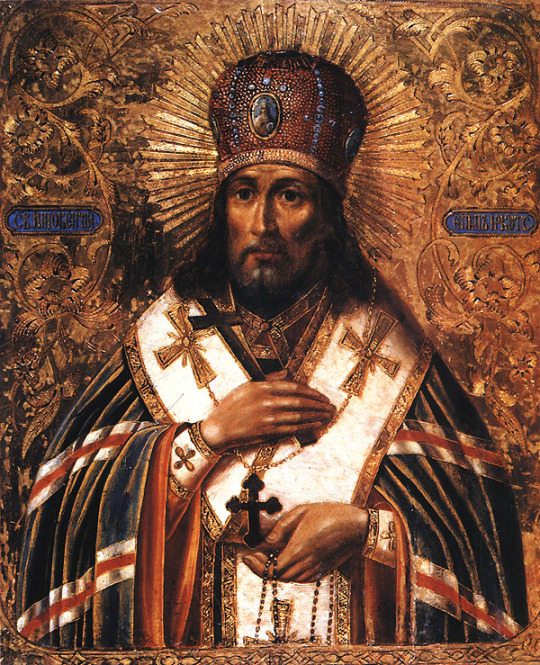
Saint Innocent, the first Bishop of Irkutsk, reposed on November 27, 1731. But because the Kursk Root Icon of the Mother of God is commemorated on that day, his Feast Day is celebrated on November 26.
After the Saint's death, his persecutors received their just retribution. Archimandrite Anthony was discredited in Beijing as unorthodox. He was returned to St. Petersburg, deposed and imprisoned. Soon afterward, the Vice-Governor of Irkutsk was executed for his crimes.
In 1764, the body of Saint Innocent was discovered to be incorrupt during restoration work on the Ascension Monastery’s Tikhvin church. Many miracles occurred not only at Irkutsk, but also in the remote places of Siberia, for those who turned to the Saint in prayer.
In 1783, there was a great fire at Ascension Monastery. Everything that could burn was burnt. However, the old wooden temple, where the Saint's body rested, remained unharmed.
On February 9, 1805, the Most Holy Synod decided to uncover the Hierarch's relics and to number him among the Saints.
On February 2, 1831, the Feast of the Meeting of the Lord, His Grace Bishop Benjamin took Vladyka's holy relics from his tomb and placed them in the midst of the Tikhvin church, and then he served the Divine Liturgy before them. A week later, on February 9, the Hierarch's relics were solemnly transferred from the Tikhvin church to the Ascension Cathedral in a Cross Procession with the wonderworking Kazan Icon of the Mother of God.
In the twenties of the XX century, a period of persecution by the new godless authorities against Christians began. The Superior of Ascension Monastery was arrested, along with other hierarchs of Siberia. In 1921, the Saint's relics were subjected to a sacrilegious medical examination, after which they were taken from the orphaned Monastery, and then they disappeared for a long time.
In 1990, in one of the churches of the city of Yaroslavl, Saint Innocent's relics were discovered in a utility room. A medical examination showed that the body, which was not touched by decay, was that of Saint Innocent. His holy relics were returned to Irkutsk, and today they rest in Znamensky Monastery.
Saint Innocent, the first Bishop of Irkutsk is commemorated on November 26 (the day of his repose), February 9 (the discovery of his relics in 1805), June 10 (Synaxis of the Saints of Siberia), September 2 (the return of his relics to Irkutsk in 1990), on October 10 (Synaxis of the Saints of Volhynia), and on the third Sunday after Pentecost (Synaxis of the Saints of St. Petersburg).
Source: Orthodox Church in America_OCA


1 PETER 4:12-5:5
12 Beloved, do not think it strange concerning the fiery trial which is to try you, as though some strange thing happened to you; 13 but rejoice to the extent that you partake of Christ's sufferings, that when His glory is revealed, you may also be glad with exceeding joy. 14 If you are reproached for the name of Christ, blessed are you, for the Spirit of glory and of God rests upon you. On their part He is blasphemed, but on your part He is glorified. 15 But let none of you suffer as a murderer, a thief, an evildoer, or as a busybody in other people's matters. 16 Yet if anyone suffers as a Christian, let him not be ashamed, but let him glorify God in this matter. 17 For the time has come for judgment to begin at the house of God; and if it begins with us first, what will be the end of those who do not obey the gospel of God? 18 Now "If the righteous one is scarcely saved, Where will the ungodly and the sinner appear?" 19 Therefore let those who suffer according to the will of God commit their souls to Him in doing good, as to a faithful Creator.
1 The elders who are among you I exhort, I who am a fellow elder and a witness of the sufferings of Christ, and also a partaker of the glory that will be revealed: 2 Shepherd the flock of God which is among you, serving as overseers, not by compulsion but willingly, not for dishonest gain but eagerly; 3 nor as being lords over those entrusted to you, but being examples to the flock; 4 and when the Chief Shepherd appears, you will receive the crown of glory that does not fade away. 5 Likewise you younger people, submit yourselves to your elders. Yes, all of you be submissive to one another, and be clothed with humility, for "God resists the proud, But gives grace to the humble."
MARK 12:38-44
38 Then He said to them in His teaching, "Beware of the scribes, who desire to go around in long robes, love greetings in the marketplaces, 39 the best seats in the synagogues, and the best places at feasts, 40 who devour widows' houses, and for a pretense make long prayers. These will receive greater condemnation. 41 Now Jesus sat opposite the treasury and saw how the people put money into the treasury. And many who were rich put in much. 42 Then one poor widow came and threw in two mites, which make a quadrans. 43 So He called His disciples to Himself and said to them, "Assuredly, I say to you that this poor widow has put in more than all those who have given to the treasury; 44 for they all put in out of their abundance, but she out of her poverty put in all that she had, her whole livelihood.
#orthodoxy#orthodoxchristianity#easternorthodoxchurch#originofchristianity#spirituality#holyscriptures#bible#gospel#wisdom#saints
1 note
·
View note
Text
The birth of Narodnaia Volia
'In 1876 Mark Natanson and others set up what might be called the first political party in Russia, in the sense that it had a central committee and branches in many of the provinces. Called Land and Freedom (Zemlia i Volia) after Herzen, in December 1876 it organized a demonstration of more than 200 people, including workers, outside the Kazan Cathedral in St. Petersburg.
From the outset Land and Freedom was troubled by a split which soon grew into a permanent division, between those who favored continuing peaceful propaganda and those who argued that only the violent overthrow of the regime could make real change possible.
Those who recommended violence were encouraged by the affair of Vera Zasulich, who in January 1878 shot and wounded the governor-general of St. Petersburg, General Trepov, in his reception room. Her case was brought to open criminal trial, before a St. Petersburg jury appointed in the normal way. To the authorities' horror, even though no one denied that an attempted murder had been committed, the jury acquitted her, accepting the plea of her advokat that she "had no personal interest in her crime," that she was "fighting for an idea."
In 1879, in accordance with this mood, a secret congress of Zemlia i Volia resolved on a policy of systematic terror with the aim of disorganizing and overthrowing the government and replacing it with a regime which would convene a constituent assembly and prepare the way for popular rule. They reconstituted themselves as Narodnaia Volia, which can be translated as either the People's Freedom or the People's Will. On 26 August 1879 the Executive Committee of Narodnaia Volia condemned Tsar Alexander II himself to death for "crimes against the people," and from then on devoted itself to putting that verdict into effect.'
Russia and the Russians, by Geoffrey Hosking
#zemlia i volia#land and freedom#narodnaia volia#peoples will#peoples freedom#vera zasulich#revolution#attentat#assassination#terrorism#tsar alexander ii
0 notes
Text

Kuray, 1934. Oil painting by Nikolay Rusakov.
Nikolay Rusakov was born in 1888 in the village of Pisklovo, Chelyabinsk district (Russia), the Orenburg governorate.
In 1913, he completed a full course in the department of painting of the Kazan Art School at the Imperial Academy of Arts. At the Moscow School of Painting, Sculpture and Architecture, Rusakov studied with the famous painter Konstantin Korovin.
Rusakov became the first Chelyabinsk artist who received a professional education in the Russian capital, and he was engaged in helping painting flourish in his hometown.
Read more
0 notes
Photo
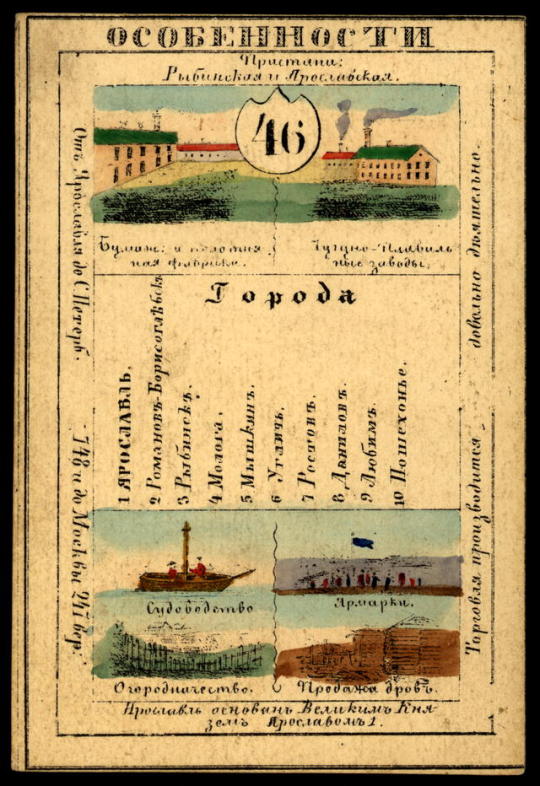
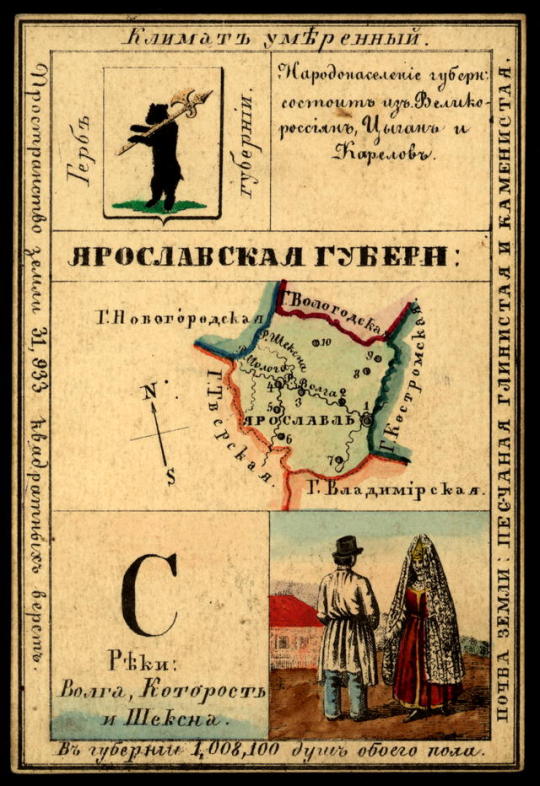
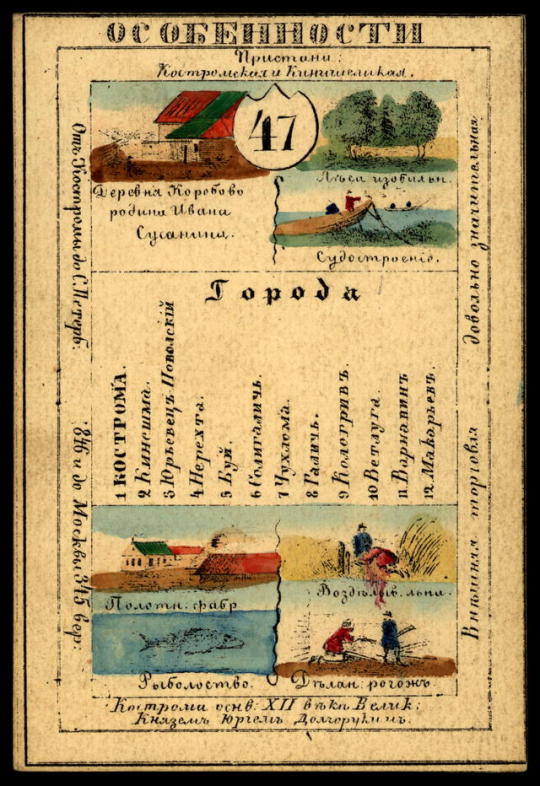
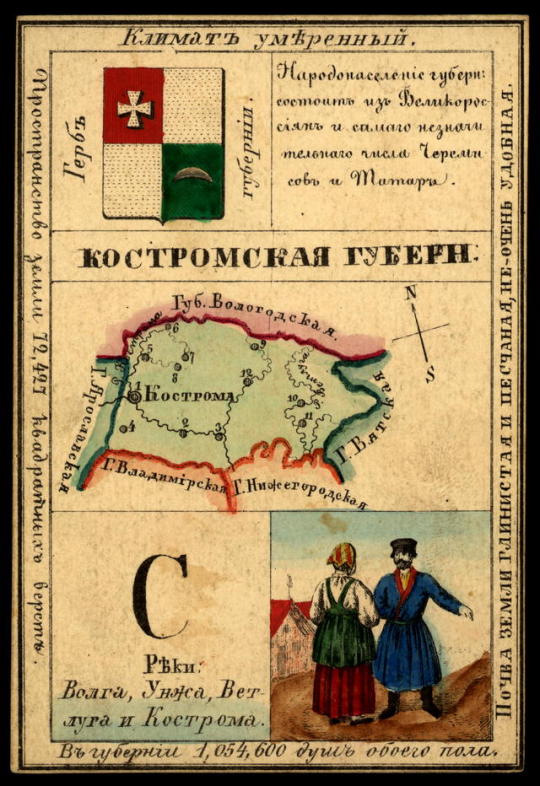
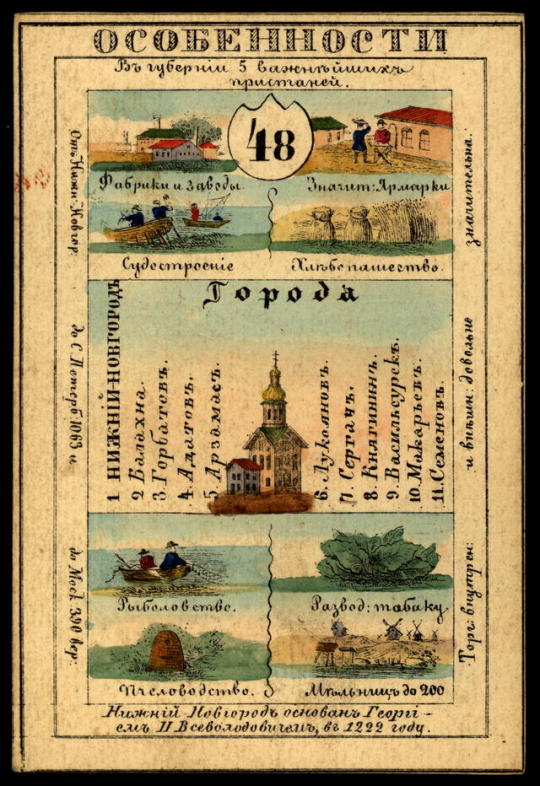

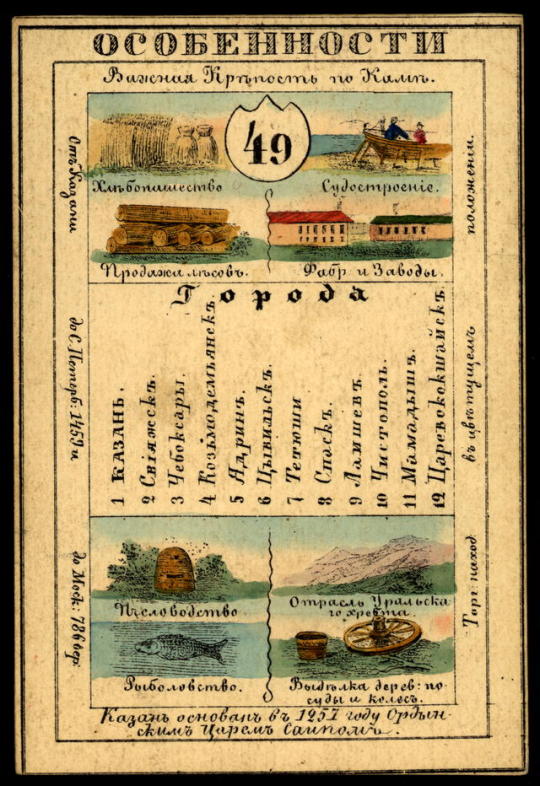
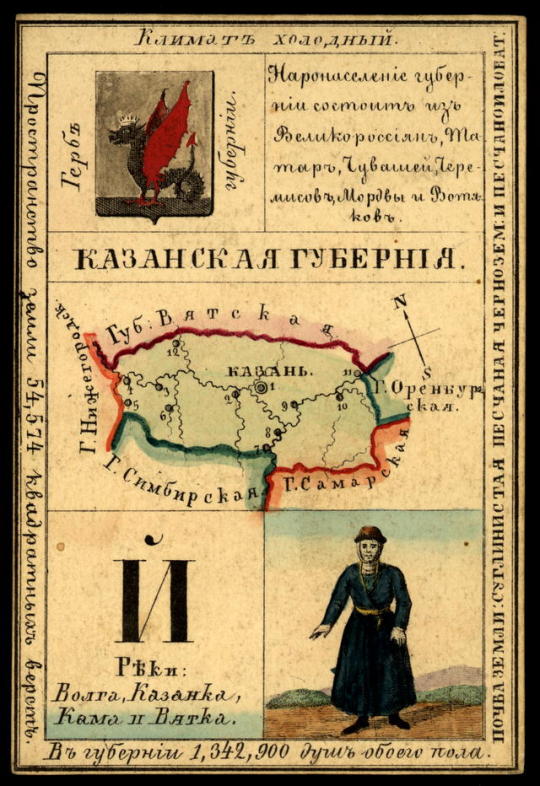
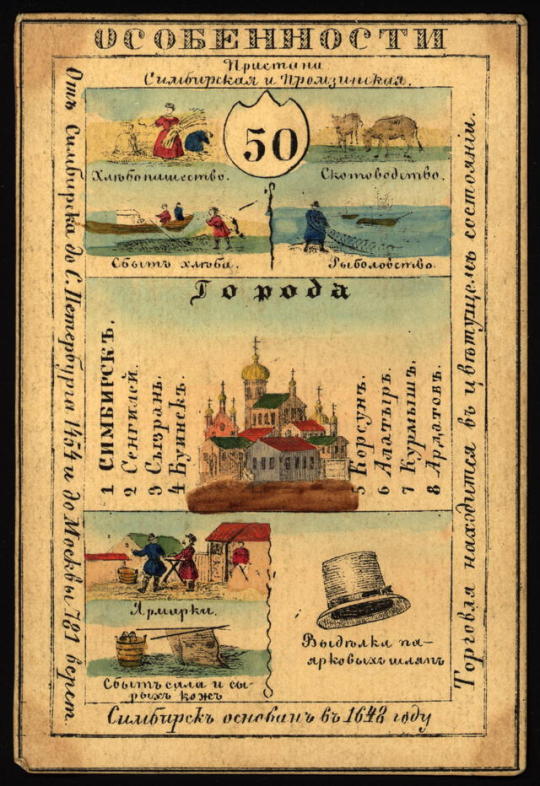
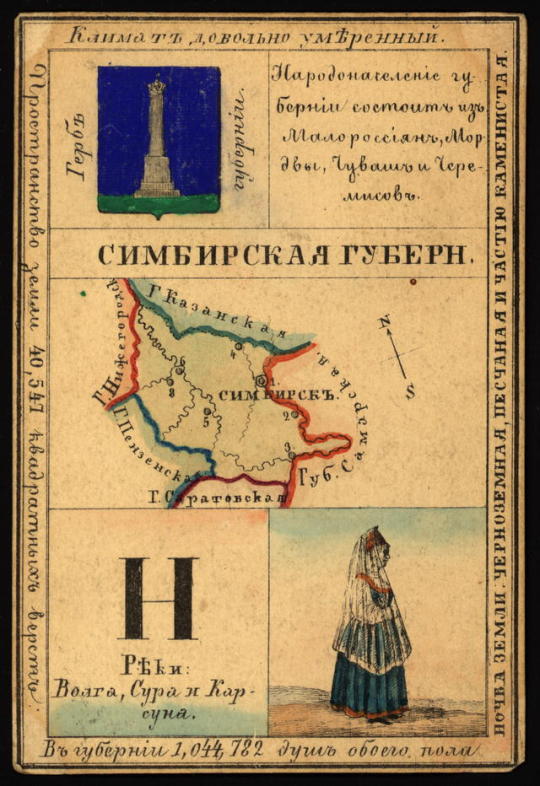
Illustrated cards for the provinces of the Russian Empire (published in St. Petersburg 1856). Each card presents an overview of the province's history, geography, culture and economics. The front depicts distinguishing features such as rivers, mountains, and major cities and industries. The back shows a map of the province, the provincial seal, information about the population, and a picture of the local dress of the inhabitants.
The cards shown here are the guberniyas (governorates) of Yaroslavl, Kostroma, Nizhny Novgorod, Kazan, and Simbirsk.
#history#art#geography#fashion#russia#yaroslavl governorate#kostroma governorate#nizhny novgorod governorate#kazan governorate#simbirsk governorate#yaroslavl#kostroma#nizhny novgorod#kazan#simbirsk#ulyanovsk
14 notes
·
View notes
Text

Mordovian peasants from Kazan Governorate, early 20th century.
Photography by Konstantin Safonov.
2 notes
·
View notes
Photo

Zoe Kazan wearing Prada at the 9th Governors Awards in Hollywood on November 11, 2017
4 notes
·
View notes
Text

ENG:
“Our lordship will favor with his good will, with the bright and pure heart of our lordship, to glorify the Lord who has glorified us”, Vlad Dragulya Tepes, April 16, 1457.
April 16, 1457, Targoviste, donation to the Cozia monastery from the governor and ruler Vlad Draguli Tepes.
Ҡ For all who are led by the Spirit of God are the sons of God, wrote the divine apostle, following his footsteps, an adherent of justice, encouraging him to do good, and they followed, wishing to rise to a new life, leaving the mortal lands, and going to heaven, where the blessed voice those who have heard it, it is always heard: "Come, blessed of My Father, inherit the kingdom prepared for you from the folding of the world."
Imzhe and I, faithful, and pious, and Christ-loving, Io Vlad the voivode and lord of the whole land of Ungrowallachia, the son of old Vlad the voivode, for this sake our lordship will favor with his good will, with the bright and pure heart of our lordship, to glorify the Lord who glorified us and to the throne of the holy one the parent of our lordship who lifted us up, and we grant this all-honorable, and honest and reverend, since over all these honors and gifts, an instruction from our lordship to the holy monastery and the holy monastery of all saints and the life-giving trinity of Cozia and the abbot, and the mentor of that monastery, priest Joseph, let them have the village of Troyanesti; on both sides Olt, with all the hotar, as there is in Troyanesti, since the monks bought that village from Dragoya, Dragoev's son, for 50 florins and a good horse of our lordship.
And let it be to the monastery with inheritance right, and with buildings without levying taxes from them, and for the service, and for collecting food, all to the bright and pious monks in health and our excellency in eternal remembrance, receiving tax-free from sheep, pigs, bees, buckets, tithes from food, and from vineyards, and from chopped wood, and from haymaking, and from carts and from carts, that is, from all kinds of services and tributes that you find in the lands of our excellency, and from everything they can charge, and not pay taxes from that. And may they not dare in that village, Troyanesti, to prevent you from doing that, neither the court man, nor the globnik, nor the tribute collector, nor none of the boyars or servants of our lordship, sent by mercy or in the service of our lordship. And if someone begins to hinder if even the Vlas is one, then such as the one that is before us the enemy of the holy trinity and this century and in the next century, will die by our wrath, as an unfaithful and criminal of our decree.
To everything and after the death of our lordship, whom the Lord will choose to be the lord of the Wallachian Land, whether it is a relative of our lordship, or, for our sins, whether it is a foreigner, then let him honor and approve all of the above, then may the Lord confirm him in his domination; and if he ruins and disgraces the saint's monastery, then the Lord will destroy and kill his body, and in the age to come, let his soul have the fate of the souls of Judas and Arius and all those people who cried out against Christ God and our salvation, his blood on them and on their children, so it is and so it will be forever, amen.
Witnesses: Maneya Udrishte, Codrea vornik and Dragomir Tsakal, Voiko Dobritsa, Stan Nyagoev, Zhupan Duka, Kazan Sakhakov, Oprya Logofet, Moldovan Spatar, Bouda Stolnik, Milea Paharnik, Iova Komis.
And I, Kalcho, wrote this decree in Targovishte, on Holy and Great Saturday, April 16, in the summer of 6965 *.
____________
RU
«благопроизволит наша светлость своим благим произволением, светлым и чистым сердцем нашей светлости, прославлять прославившего нас Господа», Влад Драгуля Цепеш, 16 апреля 1457.
16 апреля 1457, Тырговиште, дарственная монастырю Козия от воеводы и господаря Влада Драгули Цепеша, перевод группы.
«†Ибо все, водимые Духом Божьим, есть сыны Божии, писал божественный апостол, по его следам, сторонника справедливости , на дела добрые сподвигающего, и следовали,
желающие воспрянуть к новой жизни, бренные земли оставлявшие, и на небо отправлявшиеся , где блаженный глас радости слышавшие, его же присно и слышат: «Приидите, благословенные Отца Моего, наследуйте Царство, уготованное вам от сложения мира».
Имже и аз , благоверный, и благочестивый, и Христолюбивый, Ио Влад воевода и господин всей земли Оуггровлахийкой , сын старого Влада воевода, сего ради благопроизволит наша светлость своим благим произволением, светлым и чистым сердцем нашей светлости, прославлять прославившего нас Господа и на престол святопочившего родителя нашей светлости нас вознесшего, и даруем сие всечестное, и честное и препочтенное, поскольку над всеми то почестями и дарами, указание от нашей светлости святому монастырю и святой обители всех святых и живоначальной троицы Козии и игумену , и наставнику обители той, попу Иосифу, да будет у них село Троянешть; по обеим сторонам Олт, со всем хотарем, сколько есть в Троянешть, поскольку купили монахи то село у Драгойа, сына Драгоева, за 50 флорин и хорошего коня нашей светлости.
И да будет монастырю то с наследным правом, и со строениями без взимания с них налогов, и в службу , и для сбора продуктов , всё светлым и набожным монахам во здравие и нашему превосходительству в вечное поминание, получая так мытную подать с овец, свиней, пчел, ведер, десятину с продуктов, и с виноградников , и от наколотых дров, и от сенокоса, и от повозок и от возов, то есть от всех сортов служб и даней, которые найдете в землях нашего превосходительства, и со всего могут взимать, а налогов не платить с того. И да не посмеют в том селе, Троянешть, вам препятствовать в том ни судец, ни глобник, ни сборщик дани, ни никто из бояр или слуг нашей светлости , посылаемых по милости иль по службе нашей светлости. А если станет кто препятствовать аще и влас един, то таковой, как тот, что пред нами противник святой троицы и этот век и в будущий век , умрет от гнева нашего, как неверный и преступник нашего указа.
Ко всему и после смерти нашей светлости, кого изберет господь быть господином Валашской Земли, будь то родственник нашей светлости, или, по грехам нашим, будь то иноплеменник, то пусть он почитает и утверждает все вышеописанное, тогда и его самого да утвердит Господь в его господстве; а коли разорит он и посрамит монастырь святой, то и того господь разрушит и убьет тело его, а в будущий век душа его да будет иметь участь душ Иуды и Ария и всех тех людей, которые возопили против Христа Бога и спаса нашего, кровь его на них и на чадах их, так есть и так будет во веки, аминь.
Свидетели: Манея Удриште, Кодря ворник и Драгомир Цакал, Войко Добрица, Стан Нягоев, жупан Дука, Казан Сахаков, Опря логофет, Молдован спатарь, Боуда стольник, Милеа пахарник, Иова комис.
И аз, Калчо, писал указ сей в Тырговиште, в святую и великую субботу, 16 апреля, в лето 6965*».
Влад, милостью Божьей господин.
*На современный лад то -1457.
*Написано на пергаменте, 40,5 на 30.
#Vlad voda#Vlad Tepes#Vlad Dracula#vlad the impaler#Ladislau Dragkwlya#documents#history#wallachia#romania#vlad dracula tepes#April 16#1457#Targoviste#donation to the Cozia monastery
7 notes
·
View notes
Photo


I’m trying to review properly, not just spitting out incoherent words.
I got really angry reading this last year I think? I tried again recently to see if I’m less mad, and I was more chill, but it’s still not fun to read.
So the blurb is like “Samurai daughter who was betrothed to the emperor’s son survived a murder attempt, dresses as a boy, and infiltrates the would-be murderers’ group. But then because YA romance happens”. Eventually she finds out that the group’s leader is the son of the executed shogun and they were aiming to launch a reverse-Bakumatsu, i.e restore the shogunate in a land where the emperor is already in power.
It occurred to me on second reread that this was actually a Robin Hood story in Japanese costumery. I checked the reviews, and it seems that other people also noticed this. Why this is not just straight up billed as “Japanese-inspired Robin Hood retelling” is beyond me. I don’t know if it’s just Renee Ahdieh using well worn tropes that happens to be mostly Robin Hood tropes, and then is utterly oblivious about it; or she knew full well what she was doing but chose to hide the fact that Robin Hood is being used as inspiration for whatever strange reason.
Instead, the publishers/PR staff made mentions of Mulan just because the heroine dressed up as a boy. Again, going back to the Robin Hood connection: Maid Marian also dressed up as a boy to find Robin. Why was there a need to mention Mulan?
Sensitivity over Japan-China tension aside, this leads to an unfortunate situation where the Fuurin Kazan quoted in the book (Swift as the wind, silent as the forest, etc) ends up being mistaken as a reference to the “I’ll Make a Man Out of You” song from Disney Mulan. There is a part of the song that goes something like “be swift as a coursing river, with the strength of a raging fire, etc”. Like, wow, I’m not sure if I should be offended at the reviewer for not knowing, or at the publishers for causing readers to have a wrong perception of the text.
Details/elaboration behind cut:
Straight up from that quoted snippet, anyone who knows anything about Sengoku is gonna be like “Huh????” because the shogun is “Takeda Shingen”. And then you go even more WTF when you find out that the son is named “Ranmaru”. Not that Ranmaru is a unique name, mind you, but THE singular most famous Ranmaru is Mori Ranmaru, and is not supposed to be attached to Shingen like this. Another one of the name-dropped characters is Asano Naganori of 47 ronin fame, and his son is Asano Tsuneoki, and is Ranmaru’s friend. Tsuneoki is possibly a pretty common Japanese name, but one of the most well-known ones is Ikeda Tsuneoki, milk-brother and loyal vassal to Oda Nobunaga.
So naming is definitely an issue, because I’m not sure what the purpose of name-dropping famous figures here is for. A wink and a nudge to history geeks? Because this is not the case of someone borrowing names out of fear of not being able to create believable period-appropriate names. Renee Ahdieh gleefully made up whacky names for the emperor, the princes, and the heroine’s father. When I saw other people’s review, they were like “But what time period is this even???” And I agree. For those who know history, the namedrop ends up muddling the timeline, and for me it makes me want to try to map real life into the novel when it really isn’t meant to be like that.
Let me see if I can write an American equivalent of this.
"In the country called Meriken, the people are no longer satisfied by the weakwilled president Teddy Jefferson. So the rebels who wanted to become a colony of the Old World Crown again found Alexander Hamilton, son of the disgraced Governor William Howe, to become their new Governor and leader in an effort to rejoin the Crown. Also Alexander is assisted by his good friend Abraham Lincoln, who hides his name and goes by Wolf instead."
Like, for non-Americans this might mean absolutely nothing whatsoever, but it probably sounds funny if you recognize the names. (George Washington punching a tiger makes more sense than this)
The emperor is named Minamoto Masaru. In real life the emperor has no surname, and Minamoto is actually the surname of the shogun lineage. Is this supposed to be clever or funny? I’m not sure, it just looks baffling. Also, “Masaru” is such a plebeian name -- it doesn’t even suit a samurai, and even less so the emperor. Real life emperor names are like Akihito, Mutsuhito, Osahito...
The princes being named Raiden and Roku is also ridiculous. “Avatar Roku” in Avatar: The Last Airbender may sound cool, but in a setting meant to resemble shogunate Japan, this sounds absurd. It’s almost forgivable if those had been their titles. For example, the Emperor Meiji’s son Prince Michihito has the title of Aki no Miya, and would sometimes be referred to as “Prince Aki” in texts. So maybe if the princes are like “Roku no Miya [actual name here]”, that’d be fine. But those are literally their names, and that’s it, so it’s really irksome to look at.
The book straight up opens with "Ranmaru’s father” committing seppuku in this big ceremony and such (so I guess that was the shogun). In second read, this leads to me wondering just how did that work. In comparison, see, Tokugawa Yoshinobu the last shogun left his post and became a nobleman. He still lived a good life. This is not like imperial China where bloody revolutions happen, and then the rebel leader becomes the new emperor and killed everybody. Of course this is a fantasy land, because there’s shapeshifting and magic and such, but then how does this change of leadership happen?
Because really, you can’t just execute people like it’s nothing. For all the movies about samurai shanking peasants dead for the smallest of offenses, the real life Edo society does too have laws. The government don’t really throw around seppuku orders left and right. It just, you know, ends up looking suspiciously like the author is trying to go “LOOK I DID RESEARCH ABOUT JAPANESE CULTURE, DID YOU SEE MY RESEARCH??”
And now, the Robin Hood comparisons.
Mariko -> Marian/Marion
Ranmaru -> Robert/Robin
Mariko is betrothed to the Emperor’s son
Marian, in some versions, is pursued romantically by the antagonists (Sir Guy of Gisbourne, the Sheriff, even Prince John apparently??)
Ranmaru is the son of the shogun
Robin Hood is the son of the previous Sheriff (in some versions)
Ranmaru and his Black Clan steal from the rich to give to the poor
Robin Hood and his Merry Men steal from the rich to give to the poor
Mariko disguised herself as a boy and joined the Black Clan
Maid Marian disguised herself as a boy and joined the Merry Men
The Black Clan’s hideout is in a forest
The Merry Men's hideout is in Sherwood Forest
There’s also the general rebellion theme. Some versions of Robin Hood had the Merry Men be a part of a rebellion against the bad ruler Prince John, and happy end is achieved when the true king, King Richard, returns. Robin Hood becomes a nobleman again, and marries Marian.
It doesn’t really map beat-for-beat, since in Flame in the Mist Mariko’s father is one of the “bad” daimyo, and he might probably serve as the Sheriff’s equivalent. Still. A lot of the themes and plot threads match.
20 notes
·
View notes
Text
Friday 14 March 1840
7 ½
12 55/..
Astracan.
fine morning R11 ¼° at my bedhead at 8 a.m. breakfast at 9 20/.. to 10 10/.. out at 10 ½ to the Indian pagoda with George the son of our host – in vain – nothing to be seen – returned – afraid of being too late for the Brügens at 11 – Had Mr. Stewart (60 poods = 1 ton English) and then the Swede, music master, Haeffner received en société here, - till the carriage came at 11 ½ and in it Madame de Brügens’ sister and the general Attaman – off to the metched (mosque) – too soon – service begins at one – went in – vestibule, nave, and square church – good pulpit (a sort of little staircase, as usual, up to little platform to stand or squat upon) and little apse – low gallery ½ way over nave – largeish, handsomish building – far handsomer and larger and better than the little metched we saw at Moscow, or the larger we saw at Kazan – all mosques? quite plain within – then to the library – the few (a thousand or more?) books given by a merchant – still .:. librarian tho’ knowing nothing about it – would sell books par l’aune – a few birds almost all natives of the government of Astracan – 2 (jagais I think) Steppe-sheep, and a few models of vessels used on the Caspian nothing particular – and nets and models of wind-mills used for [?] water from the river for watering the gardens and of the manner of fishing in the Volga (interesting) – and a few specimens nothing particular of salt from lakes in this government – sometime turning over the plates of an old work on Russia in several 8vo. volumes by Gemlin? – then to the Cossak Institution school 26 boys – learn geography arithmetic mathematics – French and German and the Eastern languages taught at the Gymnase – Mademoiselle Attaman the sister examined one or 2 of the boys in geography – who answered readily and well – the 26 boys are fed and clothed, and the fund (furnished by the Cossacks - nothing of it paid by the emperor) is 10,000/. per annum – then to the puits artésien – 60 sagènes deep – water but not good rises to within 2 sagènes of the top – on the approach of a lighted candle the gas inflames, and burns with a blueish light and rather sulphurous smell – Dont mention it to Temirazoff – sought water found fire – disappointed – home at 1 55/.. the carriage to return for us at 3 to dinner - had the soldier with his drawings – for an exterior and an interior of the pagan temple at Tumen and the back and front of a priest, 3 drawings = 75/. – this so far passed my ideas, said I would inquire tonight what they ought to be, and would let the man know if I wanted them – put our clean filled handkerchief, and the same dress again (silk morning gown with velvet pelerine and flannel and black silk handkerchief round my throat) and silk stockings and black silk shoes – the carriage at 3 ¼ and off immediately to dinner chez les Brügens, he general Attaman des Cossaks = en tout 10,000/. per annum the general governor = 14000/. per annum but house and servants (soldiers) and wood found and the emperor has twice given him 30,000/. – the Attaman finds his own house but he has 1500/. a year allowed for it and house costs about 900/. to 1000/. including his chancellerie and 400/. = wood that there is a little to spare out of the fifteen hundred – and he too has soldiers for servants – they have one woman to wash – thee family being small – Madame de Rebenden has 2 women to wash – all the washing done at home – very nice dinner soup, and a roti (en morceaux as usual) and fish (starlet) and game, and some little gateaux the Ataman said the beef was hard – grand carême – only 10 or 12 families – or so few wanted meat, impossible to get it good now – as for me, my cold is so bad, I can neither taste nor smell –
SH:7/ML/E/24/00046
coffee – the Ataman very civil and attentive – put on his full dress Cossack uniform = 800/. did he say and common dress about 300/. – very becoming – home at 6 ½ having staid (apparently?) an unusually long while after dinner – the carriage come again for us at 8 – on our return found Mr. and Mrs. and Miss Steward – he has the rank of Captain – was head clerk in the bank here – but the bank for some malpractices of some of the gentlemen (some cheating of government) has been “put under law” – the business has been 8 years already and will be 2 or 3 years longer before it is settled – then those who have not been in fault will be cleared and those who have will be punished – but in the meantime all is stopped – rank is stationary and he is on ½ pay .:. he has taken a situation in a merchants’ house as clerk – he dined with Lord Pollington when here, and went with him to an assembly – Lord P- and his brother were at the English house here (at the missionarys) now broken up and got money of them by giving them a bill – the missionaries having lost their rights here, went away – Dr. Ross is settled near London Mr. Macpherson returned to Scotland, and Mr. Gleig is at Tabriz – Lord P- took Mr. Gleigs’ son with him as interpreter or what not – but the young man thought they treated him too much like a servant – they quarrelled and parted before Tiflis – perhaps all were in fault for all young together Lord P- 20 his brother 16 or 17 and young Gleig about 20 – It seemed as if Lord P- had made difficulty about paying G-‘s expense back – and Mr. S- seemed to think he (Lord P-) did not pay them – Kazembek Kasembek was converted here by the 3 missionaries above named – his father a Persian noblemen in command at Derbend [Derbent] under the Russians rebelled against them – his sons were sent to Persia and well educated by their friends there – K- was a handsome clever young man – came here to see his father (was the father imprisoned here?) was employed by the missionaries to write Persian for them (translation of the scriptures) and .:. converted – his father was reconciled to him before his death and on hearing him said that if he was not an old man, grey headed, - he would be a Xtian too – Mrs. Steward born in London – a poor sort of thin, pinchy-looking little woman but speaking better English than her husband – he evidently of Scotch origin and mixing foreign idioms with his own – the daughter aet. 16 hardly spoke – poor people they staid as if for ever – Madame Rebender called and sat perhaps 10 minutes or ¼ hour – they staid all the while, tho’ my conversation was all addressed to Madame R- and she good natured as she is never uttered to them – to dine with Madame R- tomorrow – the S-s staid sometime standing after Madame R- went away but at last got off – no sooner gone than another English came Mr. Strelneky or some such unEnglish like name – He said it was he who was Directeur des postes en Siberie when Captain Cochrane was there and who had travelled with him (but never on foot) so much – certainly la tête montée at times – It used to come over him now and then – his marriage very queer – at a dinner party at Irkutsk, he as usual calling his wife by an abbreviation of her name which in Russian meant ox – this being explained to her, she jumped pulled his hair off his head, and asked him how he dared call her so – on his return to England he put her to school, and left her there when he went away to the Brazils and died she never saw him more – he boasted of his Siberian tour costing him so little – his wife cost him 10,000/. – how I did not quite make out for Mr. Phackler, the vice governor came (pronounced Pheller) and my conversation was all addressed to him about
the courier, the story of Gross and the pistol-frightened [jumptschik] etc. etc. yet in spite of all this the persevering English staid till the end till 8 ¾ when the Brügens carriage having waited ¾ hour I was obliged to congédier poliement both my two visitors – the vice governor thinks the courier does not wish to go forwards with me – mentioned leaving his wife so long – not being prepared for so long a journey – perhaps he wanted tempting by some greater gain – for he had not mentioned Gross – advised my speaking to him in the morning and getting at the real reason for there would be no difficulties if he himself wished to go with me – I mentioned the 2/. per day that I had promised him, and that he knew all about the length of journey and was satisfied enough before leaving Moscow – I thought it must be the Gross affair that was at the bottom – the vice governor said it would be for me to consider whether I chose to give him any more gages or not – Mr. P- was attaché to the Russian legation at Copenhagen some years ago – would be glad to in the world again – here all Calmucks and Kerguis except the employés – but he himself grateful to the emperor who has just given him tho’ he had only been 2? years here thro’ the interest of Temirazoff 1500 arpens de terre – not yet fixed where – but in some of the governments where the emperor has land to give unstocked with peasants – off at 8 ¾ to the Brügens nobody but ourselves at dinner – baron and baroness Taube in the evening – agreeable evening – excellent kind-hearted good people and très aimable – it seems the 15,00 arpens are worth from 10/. to 15/. per arpent – Mr. P- will of course sell what he gets – he himself could do nothing with it – but someone who has peasants near will buy the land and people it – this is the way - .: the land is a perquisite worth at any rate 1,500x10 = 15,000/. – home at 11 ¼ - A- would make tea for me – had 3 cups – very fine day – Mr. Steward offered to do anything for us – a new [?] = 250/.
3 notes
·
View notes